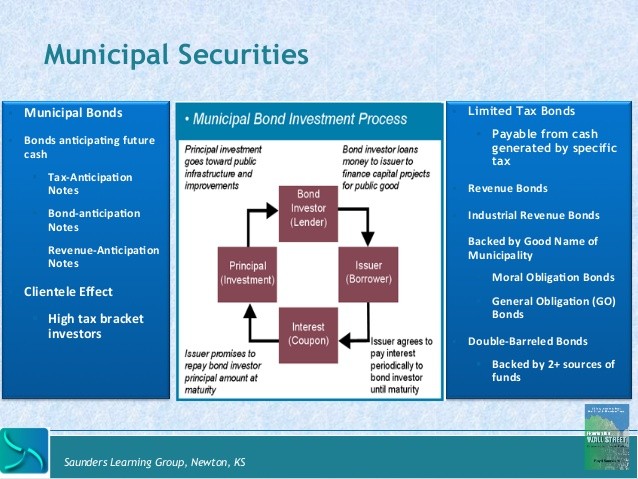Not Always Tax Free 7 Tax Traps of Municipal Bond Investing
Post on: 14 Апрель, 2015 No Comment

Key Points
- Although municipal bonds pay interest that is generally exempt from federal and state income taxes, it’s not always free from all taxes. We identify some of the taxes that could apply if you buy municipal bonds and next steps you may want to consider.
Although municipal bonds are one of the few investments that pay interest that is generally exempt from federal income taxes, the interest payments are not always free from all taxes. Below we identify some of the taxes that could apply if you buy muni bonds.
It’s important to note that taxes can be very complicated so we suggest speaking to your tax professional or reviewing IRS Publication 550: Investment Income and Expenses to determine what taxes apply to your situation.
Tax trap #1: Alternative minimum tax
The alternative minimum tax, or AMT, sets a limit on the amount of tax deductions and other tax preferences you can claim to reduce your tax bill. If the reductions would reduce the total tax below the AMT limit, the IRS requires you to pay the higher AMT. Determining your personal AMT amount can get complicated, as it involves adding back certain items.
Some municipal bonds—for example, those that fund stadiums, airports, hospitals, or more business-like enterprises—may be subject to AMT. If you are subject to AMT, your interest income from a municipal bond that is also subject to AMT is generally taxed at the rate of 28%. This would reduce the yield on a municipal bond that pays 2.50% down to 1.80%.
Next step: The good news is that you can avoid investing in munis that are subject to AMT. You can find out if a municipal bond is subject to AMT by viewing the Municipal Bond Security Description Page on Schwab.com or contacting your local Schwab representative.
Tax trap #2: De minimis tax
The de minimis tax rule mandates a higher tax rate when bonds are purchased at a discount larger than maximum amount set by the IRS. It applies to bonds purchased at a discount that amounts to more than 0.25% for each year remaining until maturity.
For example, take a bond that matures in 10 years at a face value of 100. If you were to buy this bond at a price below 97.5 (or 100 minus 0.25 points times 10 years), you would be required to pay ordinary income tax on the municipal bond. If you bought at a smaller discount, meaning you paid more than 97.5 for the bond, you would pay the long-term capital gains tax, which is generally lower than the income tax.
Next step: To avoid the de minimis tax rule, consider purchasing bonds priced at par or a premium to their face value. These bonds will generally have higher coupons, causing them to trade at higher prices, or premiums , compared to discount bonds.
Tax trap #3: Capital gains tax
We generally suggest that individuals plan to hold a bond until maturity. If you need to sell prior to maturity, though, and you receive a price greater than your cost basis, the gain will be subject to capital gains tax. Cost basis generally refers to your acquisition price after adjusting for whether the bond was purchased at a premium or a discount.
Under current tax law, the long-term capital gains tax rate is 0%, 15%, or 20%, depending upon your tax bracket. Short-term capital gains are taxed at your ordinary income tax rate.
Next step: Determining cost basis for an individual bond can get complicated quickly, as there are special reporting rules that govern the adjustments to a bond’s acquisition price. These rules vary depending on whether the bond was purchased at a discount or premium and can affect the reporting of current income. The good news is that Schwab reports your adjusted cost basis on the unrealized and realized sections of your Accounts/Positions page on Schwab.com.

Tax trap #4: State income tax
If you purchase a bond from your home state, generally it will be exempt from state income taxes. However, interest paid on bonds from outside of your home state is generally subject to state income tax. This will reduce the net income you receive from the bond. However, that doesn’t mean that you should shy away from munis from other states.
Next step: If you live in a state with low tax rates or one that issues a minimal amount of municipal bonds, we would suggest looking outside of your state. The added benefits of diversification and higher yields may make up for the hit you would take by paying state income taxes.
Tax trap #5: Increase in the taxation of Social Security benefits
If you receive Social Security now, a portion of your benefit may be taxable. That amount will depend on other income, including income from municipal bonds.
The IRS considers municipal bond interest as part of your modified adjusted gross income (MAGI) in determining how much of your Social Security benefit is taxable. If your combined income, which includes interest from tax-exempt municipal bonds and half of your Social Security benefit, is greater than $44,000 for a joint return ($34,000 for individual), up to 85% of your Social Security benefits may be taxable. 1
Next step: If you are receiving Social Security benefits, we suggest reviewing the IRS’s Publication 915 covering the taxation of retirement benefits to determine how this might apply to your individual situation.
Tax trap #6: Increase in Medicare premiums
If you’re covered by Medicare, the federally tax-exempt interest from municipal bonds may increase the amount you pay for Medicare Part B or Medicare prescription drug coverage. If you file your taxes as “married, filing jointly” and your MAGI—which includes income from municipal bonds—is above $170,000 ($85,000 for single filers) you will be required to pay an additional amount for Medicare Part B and Medicare prescription drug coverage.
The table below shows the additional amounts you may be subject to paying. It’s worth noting that to determine your Medicare premiums, the Social Security Administration generally uses your most recent federal tax return. For example, to determine 2014 income-related monthly adjustment amounts, the Social Security Administration generally uses your tax return filed in 2013 for tax year 2012.














